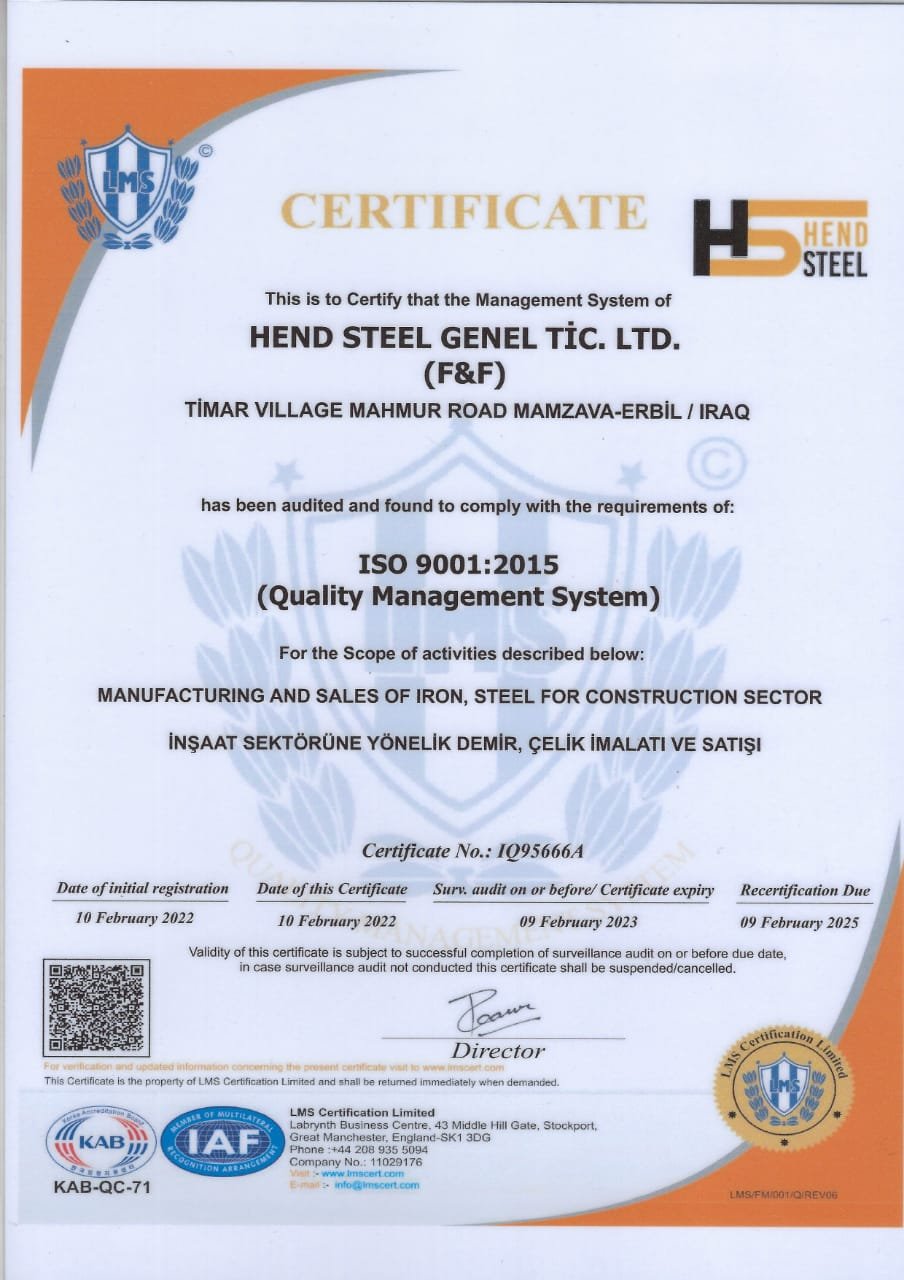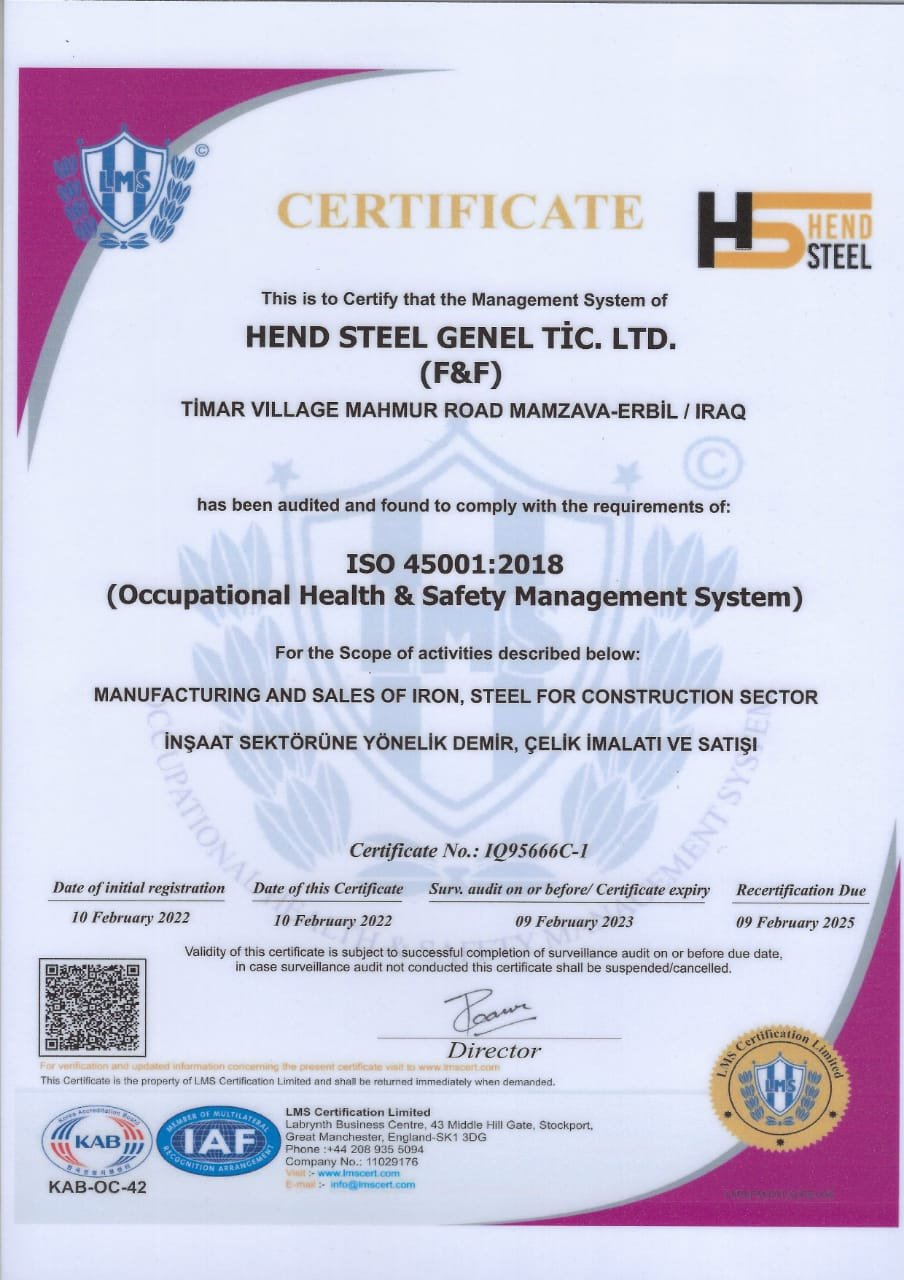FAQ
Q: Are you trading company or manufacturer ?
A: Hend Steel is a professional manufacturer for steel pipes and tubes, as well as is a highly professional trade company for common constructional steel products. We can provide a wide range of steel products for the constructional market.
Q: Do you accept the third party inspection?
A: Yes, sure we accept.
Q: Do you provide samples? Is it free or extra?
A: Yes, we can provide FOC samples upon customer’s request. However, the courier freight fees, any customs duties, other taxes and charges should be covered by the requesting customer.
Q: Will you deliver the goods on time?
A: Continuing reliability is our company's principle. We always strive for providing the best quality products, delivered right in time, always.
Q: Can I place a sample order and what is your MOQ, if I accept your quality?
A: Yes, you may place a sample order based on our explanations in “A-3” above. The customized samples will take about 5-7 days, and MOQ is 1 ton.
Q: How could you guarantee your products?
A: A Mill Test Certification is supplied with the shipment, normally. We also accept and support a credible third-party inspection, if required. We can issue a warranty to relevant customer to guarantee our product quality.
Q: How can I get the price of needed product?
A: Please provide us with your required product details and we shall reply you within the shortest possible time with the pricing.
Q: Are you a trading company or a manufacturer?
A: We are a manufacturing company.
Q: What is your packing method?
A: Standard export packaging or as required.
Q: What are the advantages of your products?
A: We utilize state of the art equipment used by an experienced team and by keeping sufficient inventory. We assure our product quality, support customization, and ensure timeously delivery.
Q: How long is your delivery time?
A: Delivery time is calculated by the order quantity. However, if the goods are available in stock already, it is usually 5-10 days. Or, if the goods are yet to be produced, within 30 days.
How Is Rebar Made?
If you’ve ever had a concrete surface poured at your home, such as a driveway or patio, you’ve also had a key component installed – rebar.
First thing to remember, rebar is reinforcing bar. Steel bars are used as rebar because the elongation of steel due to high temperatures (thermal expansion coefficient) nearly equals that of concrete. Therefore, rebar is incorporated to reinforce concrete and impart the tensile strength needed to make sure concrete stays in place. Since concrete naturally expands, the product helps keep the concrete in check, making sure it will last as long as your structure does.
How Is Rebar Made?
From Scrap Steel
Most rebar produced is produced using an EAF steel making process, or Electric Arc Furnace. Here, scrap steel is collected from various sources at the steel mill and put into a large furnace where the steel is then melted at temperatures up to 1,630’C. In this state, the molten steel will be poured into a ladle.
Molten Steel
Then, the molten steel is taken to a Ladle Furnace where the required alloying additions are made, steel cleanliness and homogeneity are assured, as well as, the steel temperature is raised to casting temperature. The steel is then teemed from the ladle into a tundish. The tundish is used to feed the steel into the casting molds. In fact, this method also gives the molten steel a smoother flow. Following, the molten steel is poured into a series of casting molds that gives the steel its mid product shape. As a result, the shapes formed are known as billets which are used later in the process of forming the rebar.
ROLLING MILL
The rolling mill is comprised of an annealing furnace, and roughening mill stands, intermediate and finishing stands to obtain the required size rebar.
Rough Mill Section
After the billet leaves the caster, it then goes into the roughing mill. At the roughing mill, the larger billets will be hot rolled into small shapes by continuously reducing the billet at each stand on the roughing portion of the mill.
Intermediate and Finishing Sections
After the roughing mill section, the worked billets pass through the intermediate section of the rolling mill. As it goes through the stands, at this section, the billets begin to take shape into the bars. After the intermediate section of the mill, the bar passes through the finishing section which gives its final shape and that “tied knot” look that is ideal for reinforcing applications.
Cut to Size
From here, the bars enter the cutting section; typically, a flying shear saw to specific lengths that are programmed in by the mill operator. Then, the bars exit onto a cooling bed! The cooling section of the mill is used so the material is cooled back to room temperature before the product is sheared to the final customer specific length.
Shipped
Overall, rebar is then bundled using automated bundling systems to the customer’s specifications. The product is usually transported by a flatbed trucks.
Rebar Sizes
At Contractors Steel, we carry rebar to the B500BWR Grade 60 specification in the following sizes:
|
Normal Diameter
(mm)
|
Cross-sectional area
(mm sq)
|
Mass per metre
Length, kg/m
|
|
10
|
78.5
|
0.617
|
|
12
|
113
|
0.888
|
|
16
|
201
|
1058
|
|
20
|
314
|
2.47
|
|
25
|
491
|
3.85
|
|
30
|
804
|
6.31
|


